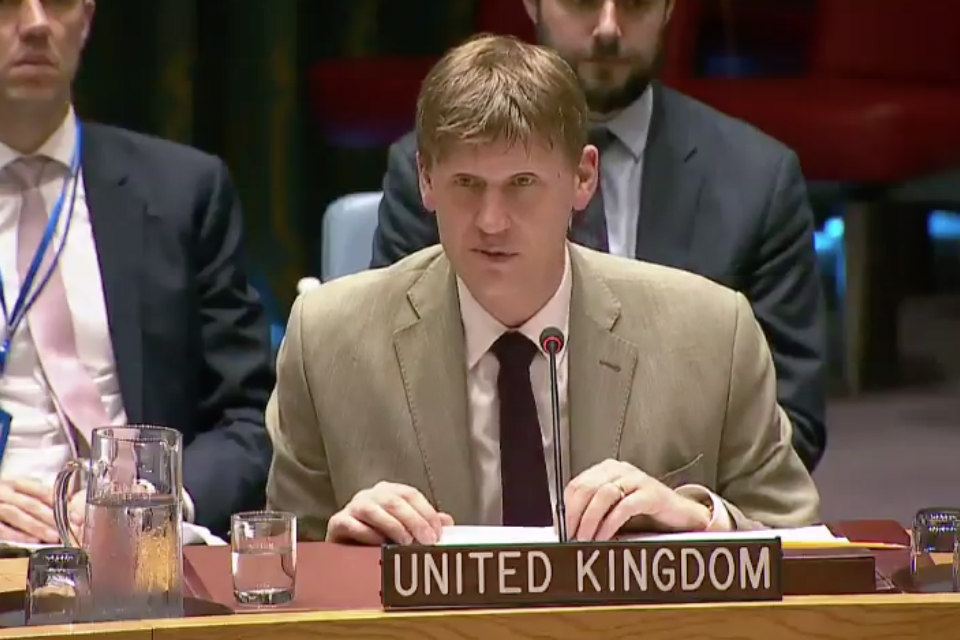Encouraging an integrated approach to address the causes of instability in Mali and the Sahel
Statement by Ambassador Jonathan Allen, UK Deputy Permanent Representative to the UN, at the Security Council Briefing on Mali.

Thank you Mr President. And I would like to thank Under Secretary-General Lacroix for his briefing and welcome His Excellency Mr Coulibaly to the Council.
The United Kingdom continues to support MINUSMA. We recognise the challenging circumstances in which its military and civilian personnel operate and we unequivocally condemn the recent attacks against MINUMSA personnel. MINUSMA must receive the tools it needs to protect its personnel adequately.
At the same time, we applaud the positive impact MINUSMA has had, particularly in supporting the recent progress on the Peace Agreement, ahead of the upcoming elections.
Mr President, as the Secretary-General made clear in his recent report, the deteriorating humanitarian and security situation in Mali is greatly concerning. During the June to August lean season this year, more than 4.3 million people will require humanitarian assistance. This is over a quarter of the population.
The United Kingdom is one of the larger humanitarian donors to the Sahel region. Between 2015 and 2018, we will have provided over $250 million of humanitarian aid with a further $67 million of assistance to the region in 2018. And the international community and Malian government must fulfil their humanitarian pledges and commitments in light of the impending crisis.
Mr President, political stability is crucial to address the root causes of the situation in Mali. In this regard, the United Kingdom welcomes the recent positive steps taken by the parties towards implementation of some of the key provisions of the Peace Agreement and the Prime Minister’s support to implement the Agreement ahead of the upcoming elections. And I agree with distinguished representative of France on the key concrete next steps that we need to see.
Honourable Foreign Minister, this Council has become increasingly concerned by the pace, the slow pace, of implementation of the Peace Agreement at a time when MINUSMA troops are paying the price with their lives in unacceptable numbers. I understand that elections are underway, but I would urge you in the most respectful and friendly way, to take back to all parties to the Peace Agreement and to the presidential candidates the expectation of this Council for fast and deep implementation of the Agreement. Patience is running out.
It is also important that the key constituencies of Malian society, including women, play a central role in the implementation of the Peace Agreement and beyond. As we all know, an inclusive Peace Agreement is much more likely to succeed. We hope the Malian government will observe the target it set for itself, in its law of 2015, for a 30% minimum representation for women in elected and nominated positions.
The upcoming elections, if they are credible, free and fair, present an opportunity for Malians to express their democratic rights and commitments. Above all, these elections should not be subject of violence. We call for calm from all parties at this time and for MINUSMA to support dialogue between the parties throughout the upcoming electoral cycles.
The United Kingdom is concerned by recent reports of human rights abuses in Mali, and particularly those allegedly committed by the armed forces. A failure to protect civilians would erode trust in the Government and feed extremist recruitment narratives. We call upon all parties to comply with their obligations and put an end to violations and abuses.
Mr President, as we begin negotiations on MINUSMA’s mandate renewal, I again underline the United Kingdom’s strong support for the mission. It is important that we address the recommendations from the strategic review through this process to continue to improve MINUSMA’s effectiveness on the ground. This includes further development of a long-term strategy for MINUSMA, a clear prioritisation of tasks, and recognition that other actors, including the UN Country Team, may be better placed to deliver results.
Whilst we recognise the logic of consolidating MINUSMA’s presence, we believe that maintaining the current geographical focus is important for the implementation of the Peace Agreement and the long-term stabilisation of the country.
Finally, it is essential that all actors across Mali and the Sahel take a coordinated and integrated approach, in line with the UN Integrated Strategy for the Sahel. A solution which addresses the underlying causes of instability is the only way to ensure long-term security in the region. The ultimate solution will be a political one, underpinned by effective security and economic development. It must be inclusive, gender-responsive and ensure the full and equal participation of the whole of society, including particularly women, to succeed. It must provide economic opportunities and present an attractive alternative to violence and extremism. This is the best way to improve the lives of those who live in Mali and the best way to improve our collective peace and security.
Thank you Mr President.